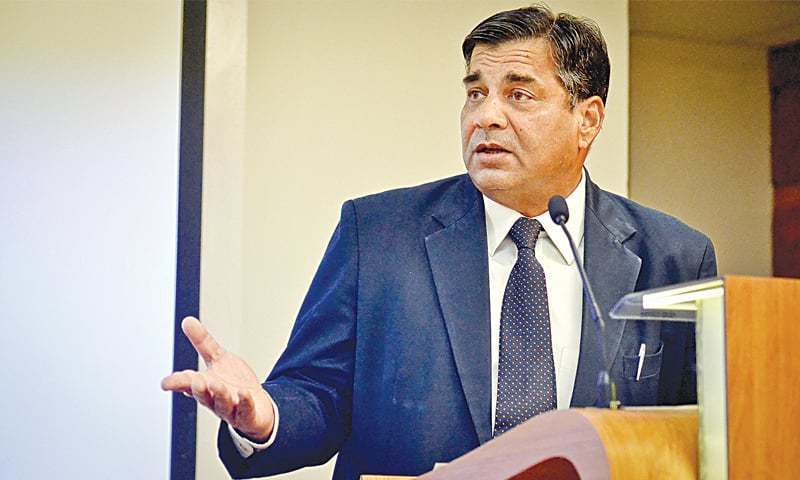LAHORE: Indian High Commissioner Dr T.C.A. Raghavan urged Pakistan on Wednesday to understand his country’s perspective on terrorism instead of coming up with a “defensive stance” whenever the issue is raised.
“There is a need to understand why we are raising this issue,” he said, adding that the two countries should candidly discuss the issue of terrorism.
He said that Pakistan had faced a lot of terrorism which, he added, would have to be looked into from different angles so that the two countries could move forward.
He was delivering a lecture on “The Peace Dividends” at the Human Rights of Commission of Pakistan office. The lecture was attended by a large number of rights, peace and civil society activists and academicians, including I.A. Rehman, Hina Jilani and Dr Mubarak Ali.
“There is a need to understand why we are raising this issue”
Mr Raghavan said that though the two countries had made a lot of progress in developing good relations, mainly through technology (internet and satellite television) and travel facilities, they were required to develop trust in each other. “Without this, issues like the Kashmir dispute cannot be resolved.”
He said India wanted peace with its neighbours to strengthen its economy. Its major achievement has been the attainment of six per cent GDP growth despite its diversity and huge population. And it wants to raise it further to seven to eight per cent in 25 years in order to meet challenges like poverty.
He said Indian (presumed) aspirations about its regional and global approaches as discussed by defence experts did not match its top priority of raising its GDP growth rate. It was important to heed this priority, he added.
He said historically relations between Pakistan and India had been complex. But they were not bad before the 1965 war when they signed the Indus Basin Water Treaty. It was a landmark achievement and both the countries have been remarkably sticking to it.
The diplomat said neighbours did have historical legacies which should not influence their policies to each other.
He said the dividends of peace would enable India and Pakistan to focus on their domestic challenges. “We have a huge challenge of development and transferring its benefit to our people.”
He said no relations were without contests and competitions, but that did not mean conflict. “We need to move ahead despite the issues.”
Against general perception, he said, relations between the two countries had been getting better over the past 10 to 15 years mainly due to technology (means of communication) and travel. “There has been more travel and communication through internet and satellite television network than in the past, helping peoples of the two countries to better understand each other without the filter of the governments,” he said. “Technology and travel also raise humanitarian issues and help the governments of the two countries to quickly resolve them.”
He said the pace (of developing good relations) might be slow but there had been more interaction and trade between the two countries. There has been interaction on different formidable issues on the agenda of the two countries.
Their prime ministers recently met in Russia and there have been border flag meetings. Replying to questions, Mr Raghavan said relations between the two countries before 1965 were better because then politicians, establishments and bureaucrats knew each other and there was an understanding that the two sovereign countries should move forward. “This part of the history should be studied.”
As in Pakistan, he said, people in India too held a passionate point of view on Kashmir and the presence of such cross-border passions would not allow any improvement in the relations between the two countries. The issues could be resolved only after building trust in each other, he added. “Lack of trust multiplies doubts.”
He said those creating tensions on the borders were not hidden and the solution was more flag meetings.
He said visa regime had been eased by the two countries over the years. The two countries had talked of group tourism three years ago but later Pakistan did not agree to it. Now prime ministers of the two countries have talked of religious tourism.
He said it was not correct to say that Indian politicians ran their election campaigns on anti-Pakistan sentiment. “Our election campaigns are not based on foreign policy. In fact, the media in the two countries amplifies issues but we should try to understand the issues in a wider perspective,” he said.
The diplomat said people in India blamed Pakistan for cross-border violations (of ceasefire). “Both of the countries indulge in cross-border shelling. There is a need to sit and talk on the issue.”
Clarification:
Meanwhile, the Indian High Commission, in a statement, has stated that in his press talk a day earlier the high commissioner was misquoted on the CPEC issue. The statement said Mr Raghavan did object to the project, as he did on Karakoram highway, as the proposed economic corridor passes through an area in the northern region that is a disputed territory.
Published in Dawn, August 13th, 2015
On a mobile phone? Get the Dawn Mobile App: Apple Store | Google Play

































